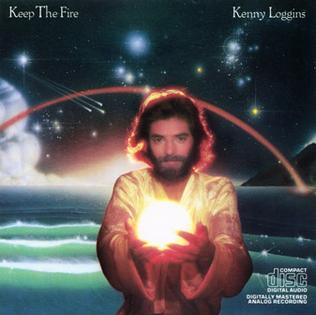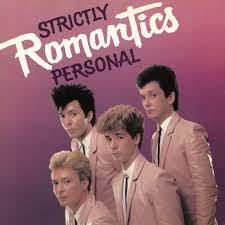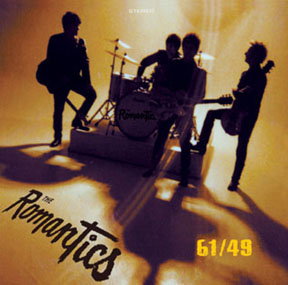
Rick Derringer is an American musician, producer, and songwriter. He gained success in the 1960s with his band, the McCoys. Their debut single, "Hang on Sloopy", became a number-one hit in 1965 and is now regarded as a classic track from the garage rock era. The McCoys had seven songs chart in the top 100, including covers of "Fever" and "Come on Let's Go".

Diablo Canyon is an album by the American Southern rock band Outlaws, released in 1994. Hughie Thomasson was the only original member of the band.

The Romantics are an American rock band formed in 1977 in Detroit. The band is often put under the banner of power pop and new wave. They were influenced by 1950s American rock and roll, Detroit's MC5, the Stooges, early Bob Seger, Motown R&B, 1960s North American garage rock as well as the British Invasion rockers.

Play Me Backwards is an album by the American musician Joan Baez, released in 1992. The album was nominated for a Grammy for Best Contemporary Folk Recording. Baez supported it with an international tour.

"What I Like About You" is a song by American rock band the Romantics, released in December 1979 as the lead single from their 1980 self-titled debut album. The song was written by band members Wally Palmar, Mike Skill and Jimmy Marinos. Marinos, the band's drummer, is the lead vocalist on the song. The band filmed a music video for the song that appeared frequently on MTV during the early 1980s.

Paul Granville Samwell-Smith is an English musician and record producer. He was a founding member and the bassist of the 1960s English rock band the Yardbirds, which launched leading guitarists Eric Clapton, Jeff Beck and Jimmy Page to fame.

View from the House is the eleventh studio album by American singer-songwriter Kim Carnes. It was released on July 25, 1988, by MCA Records. The album marked a return to her early country music roots. Carnes recorded the album in Nashville, Tennessee, and co-produced the album with Jimmy Bowen.

Keep the Fire is the third studio album by American singer-songwriter Kenny Loggins, released in 1979. It is perhaps best known for the hit single "This Is It". The song was co-written by Michael McDonald, who also performed on the track. Michael Jackson sings backup vocals on the track "Who's Right, Who's Wrong".

Show Business is the sixth album by the American rock band Kix. It was released in 1995 through CMC International, following their departure from Atlantic Records. Kix supported the album with a North American tour.

Rhythm Romance is the fifth album by Detroit rock band the Romantics, released on Nemperor Records in 1985.

The Romantics is the debut album of American rock band the Romantics, released on 4 January 1980 under Nemperor Records, giving it the distinction of being the first pop record released in the 1980s. It includes the Billboard Hot 100 hit "What I Like About You", which peaked at No. 49.

Strictly Personal is the third album by the Romantics. It was released in 1981 on Nemperor Records.

In Heat is the fourth album by the American band the Romantics. It was released in 1983 on Nemperor Records. It was the Romantics' most commercially successful album, and featured the Romantics' biggest hit single: "Talking in Your Sleep", peaking at No. 3, and a second top 40 hit, "One in a Million", charted No. 37.

61/49 is the sixth studio album by the Romantics. It was released by WEB Entertainment in 2003, 18 years after their previous album Rhythm Romance, marking their biggest gap between their releases.

The Definitive Collection is a 1997 greatest hits album of all the singles released by Cleveland, Ohio singer-songwriter Eric Carmen. It features five hits by the Raspberries, a power pop group which he led in the early 1970s. It also contains his versions of two major hits which he wrote for Shaun Cassidy, his popular song from the movie Dirty Dancing, and his greatest hit, "All By Myself", which peaked at No. 2 on the Billboard Hot 100 on March 5, 1976.

Have 'Twangy' Guitar Will Travel is the debut album by the guitarist Duane Eddy. It was released in 1958 on Jamie Records, as JLP-3000. There were five charting singles and a B-side of an additional charting single taken from this album.

Volodymyr Palamarchuk, known professionally as Wally Palmar, is an American musician best known as a founding member and lead singer of the Detroit rock band the Romantics.

Rock On! is an album by the American musician Del Shannon, released posthumously in October 1991.
The Empty Hearts are an American garage rock supergroup band formed in New York City in 2013. which produced its first album and launched its first tour in 2014.
The New Trocaderos is an independent American rock 'n' roll/power pop/indie rock/garage rock band formed in November 2013 by New England natives Brad Marino and Geoff Palmer of The Connection, and Kurt Baker of the Kurt Baker Band. The group has released several EPs including The New Trocaderos and Frenzy in the Hips, with John Borack of Goldmine Magazine calling the band "sort of a mini-supergroup" and describing its sound as "a louder version of mid-'70s Dave Edmunds all hopped up on stimulants." Their first full-length album, Thrills & Chills, was released on August 20, 2015, and a vinyl release and sold out tour of Spain took place in October. Pop that Goes Crunch described the band's music as "timeless rock ‘n’ roll for the modern world."


















